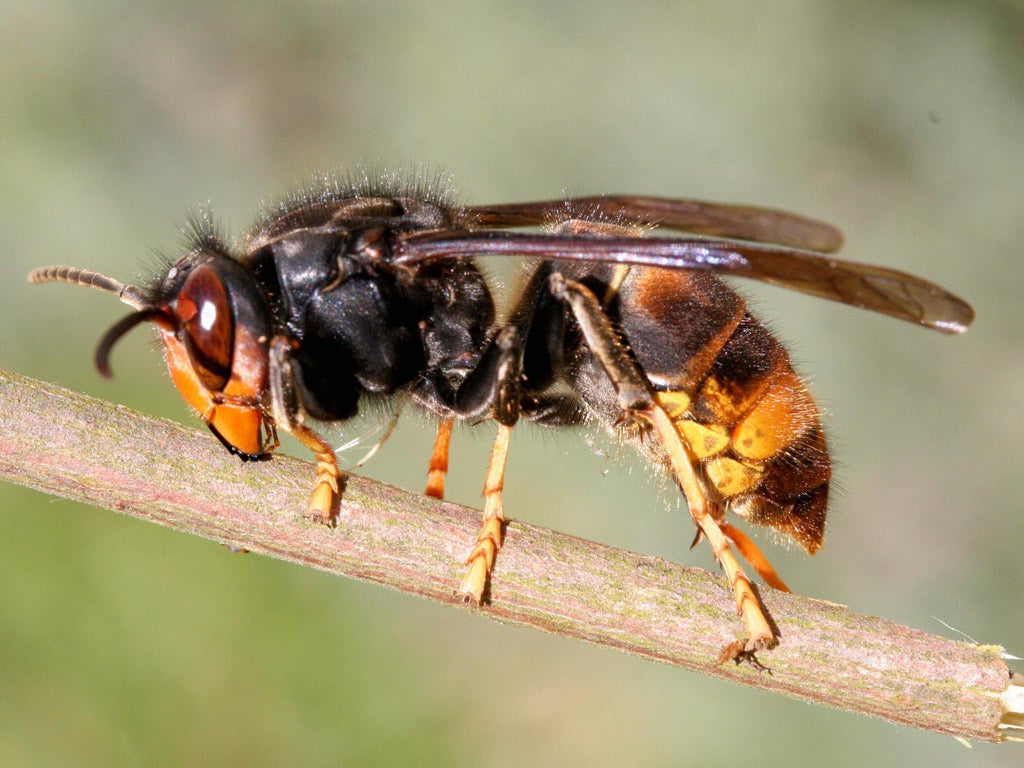Asian hornet warning as bee-killers could bring ‘ecological nightmare’ to UK
The insects can kill up to 30 bees a day and threaten biodiversity and honey production

Your support helps us to tell the story
From reproductive rights to climate change to Big Tech, The Independent is on the ground when the story is developing. Whether it's investigating the financials of Elon Musk's pro-Trump PAC or producing our latest documentary, 'The A Word', which shines a light on the American women fighting for reproductive rights, we know how important it is to parse out the facts from the messaging.
At such a critical moment in US history, we need reporters on the ground. Your donation allows us to keep sending journalists to speak to both sides of the story.
The Independent is trusted by Americans across the entire political spectrum. And unlike many other quality news outlets, we choose not to lock Americans out of our reporting and analysis with paywalls. We believe quality journalism should be available to everyone, paid for by those who can afford it.
Your support makes all the difference.Beekeepers have warned Asian hornets could bring an “ecological nightmare” to the UK as the predators work their way across the continent.
The yellow-legged insects, which have a distinctive orange band across their abdomens, is an invasive species that was spotted in record numbers in the UK last year. They are said to pose a major threat to British honey bees and can eat 30 to 50 a day.
The Somerset Beekeepers Association has urged the public to keep a watchful eye out for the species, in a letter to Somerset Council while ecologists have asked Britons to report suspected sightings on the Asian Hornet Watch app.
A senior member of the group has warned workers clearing and cutting shrubs and trees to be careful, as they could accidentally disturb Asian hornet nests.
Have you spotted Asian hornets in the UK? Email lydia.patrick@independent.co.uk
Asian hornets were introduced to France by accident in 2004, and are believed to have arrived in a shipment of goods from east Asia. They have consumed large numbers of bees in France, including the European honeybee and lesser-known solitary and colonial bee species, according to the RSPB. Since then, the species has spread rapidly and has spread to adjoining countries.

Belgium is currently preparing for an Asian hornet invasion, with the region of Wallonia is stepping up efforts to combat the spread.
The Regional Minister of Agriculture, Willy Burlus, has pledged €267,000 to target the hornets, protect beehives and remove nests.
“Last year, despite technical delays in acquiring the necessary equipment, about 200 nests were neutralised within a month,” Borsus told the Brussels Times. The Minister emphasised the need to protect the beekeeping sector to sustain biodiversity.
“Neutralising Asian hornets is a necessary measure to preserve the beekeeping sector,” he said. “We must continue our efforts.”
Italy is also concerned about the hornets, with MEP Salvatore De Meo told Il Messaggero branding them “voracious predators”.
Join our commenting forum
Join thought-provoking conversations, follow other Independent readers and see their replies
Comments